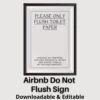Introduction
As the Airbnb market continues to grow and evolve, standing out from the competition has never been more crucial. In 2024, hosts must be more strategic than ever to ensure their listings appear at the top of search results, attracting the attention of potential guests. This is where Airbnb SEO (Search Engine Optimization) comes into play.
Airbnb’s search algorithm determines which listings are shown to users based on various factors, including listing activity, response time, and guest reviews. By optimizing these elements, you can significantly increase your listing’s visibility, leading to more views, clicks, and ultimately, bookings.
This blog post will guide you through 12 essential Airbnb SEO tips designed to help you enhance your listing’s performance in 2024. Whether you’re a seasoned host looking to boost your bookings or a new host aiming to make a strong start, these tips will provide you with the tools and knowledge you need to succeed in the competitive Airbnb landscape.
1: Understanding Airbnb’s Search Algorithm
To effectively optimize your Airbnb listing for better visibility and increased bookings, it’s crucial to first understand how Airbnb’s search algorithm works. The algorithm is the system Airbnb uses to determine the order in which listings appear in search results, and mastering its mechanics can significantly boost your listing’s chances of being seen by potential guests.
What is Airbnb SEO?
Airbnb SEO refers to the strategies and techniques used to improve your listing’s rank in Airbnb’s search results. Just like with traditional search engines, Airbnb’s algorithm considers various factors to determine which listings are most relevant to a guest’s search query. By optimizing these factors, you can enhance your listing’s visibility, making it more likely that guests will find and book your property.
Key Factors Influencing Ranking
Listing Activity: Regular activity on your listing, such as updating your calendar, adjusting your pricing, or responding to guest inquiries, signals to Airbnb that your listing is active and relevant. The algorithm favors listings that show consistent engagement, so staying active on the platform is essential.
Response Time and Rate: How quickly and consistently you respond to guest inquiries plays a significant role in your ranking. Listings with fast response times and high response rates are seen as more reliable and are likely to rank higher in search results. Aim to respond to all inquiries within an hour to maximize your chances of being prioritized by the algorithm.
Guest Reviews: Positive reviews are one of the most powerful factors in Airbnb’s algorithm. A high volume of positive reviews indicates to Airbnb that your listing offers a great guest experience, which the platform rewards with better visibility. Encouraging guests to leave reviews after their stay can significantly boost your ranking.
Booking Frequency: Listings that are frequently booked tend to rank higher in search results. This is because consistent bookings signal that your property is desirable and well-managed. Ensuring that your pricing is competitive and offering flexible booking options can help maintain a steady flow of bookings.
Instant Book: Enabling Instant Book allows guests to book your property without waiting for approval, which the algorithm favors as it provides a seamless user experience. Listings with Instant Book enabled often appear higher in search results, making this a valuable feature to consider.
Pricing Competitiveness: The algorithm considers whether your pricing is competitive relative to similar listings in your area. Using Airbnb’s dynamic pricing tools or regularly adjusting your rates based on local demand can help keep your listing competitive and more visible.
Why It Matters
Understanding these key factors and how they influence your listing’s rank is the first step toward optimizing your Airbnb SEO. By focusing on the areas that the algorithm prioritizes, you can ensure that your listing appears higher in search results, leading to increased visibility, more clicks, and ultimately, more bookings. In the following sections, we’ll dive into specific tips and strategies that leverage these factors to help you maximize your listing’s performance in 2024.
2: Optimize Your Listing Title
Your Airbnb listing title is one of the first things potential guests see when browsing through search results. It plays a crucial role in capturing their attention and enticing them to click on your listing. A well-crafted title can significantly impact your listing’s visibility and booking rates, making it essential to optimize this aspect of your Airbnb SEO strategy. Here’s how to create an effective listing title that not only stands out but also improves your search ranking.
Keyword Integration
Incorporate Relevant Keywords: Just like in traditional SEO, using the right keywords in your Airbnb listing title can help improve your visibility in search results. Think about what terms potential guests might use when searching for a property like yours. Common keywords might include the property type (e.g., “apartment,” “cabin”), location (e.g., “downtown,” “beachfront”), or specific features (e.g., “hot tub,” “pet-friendly”). By including these keywords naturally in your title, you increase the likelihood that your listing will match the search queries of potential guests.
Avoid Keyword Stuffing: While it’s important to include relevant keywords, avoid cramming too many into your title. Keyword stuffing can make your title seem unnatural and less appealing to potential guests. Instead, focus on creating a title that reads smoothly while still highlighting the key features that make your property stand out.
Crafting an Engaging Title
Be Descriptive and Specific: Your title should give potential guests a clear idea of what they can expect from your property. Instead of a generic title like “Cozy Apartment,” opt for something more descriptive and specific, such as “Modern Downtown Loft with Free Parking & Rooftop Access.” This not only provides more information but also sets your listing apart from others.
Highlight Unique Selling Points: What makes your property unique? Whether it’s a stunning view, proximity to popular attractions, or luxurious amenities, make sure to feature these selling points in your title. For example, “Charming Beachfront Cottage with Private Pool and Ocean Views” immediately conveys the unique appeal of the property and entices guests to learn more.
Use Power Words: Certain words can evoke emotion and create a sense of urgency or excitement. Words like “luxury,” “exclusive,” “newly renovated,” or “spacious” can make your listing more appealing and encourage potential guests to click through to your listing. Use these power words sparingly and strategically to enhance the impact of your title.
Examples of Effective Titles
- “Luxury Penthouse with Panoramic City Views and Hot Tub”: This title combines luxury, an attractive amenity (hot tub), and a unique feature (panoramic views) to capture attention.
- “Cozy Cabin in the Woods with Fireplace and Hiking Trails”: Highlights the property’s rustic charm and nearby activities, appealing to nature lovers.
- “Beachfront Villa with Private Pool and Sunset Views”: Focuses on the beachfront location and premium amenities, which are key selling points for vacationers.
By optimizing your Airbnb listing title with relevant keywords, descriptive language, and unique selling points, you can improve your search ranking and attract more potential guests. Remember, your title is often the first impression potential guests will have of your property—make it count! In the next section, we’ll discuss how to use high-quality photos to further enhance your listing’s appeal and drive more bookings.
3: Use High-Quality Photos
High-quality photos are a critical component of your Airbnb listing’s success. They are often the first thing potential guests notice when browsing through listings, and they play a significant role in whether someone decides to click on your listing or scroll past it. In 2024, where competition is fierce, ensuring your photos are top-notch can significantly improve your listing’s visibility and attractiveness. Here’s how to use photos effectively to boost your Airbnb SEO and increase bookings.
Importance of Visuals
First Impressions Matter: Photos create the first impression of your property. High-resolution, well-lit images can convey the cleanliness, comfort, and unique features of your space. Listings with professional, high-quality images are more likely to attract clicks, as they stand out in search results. Poor-quality images, on the other hand, can deter potential guests, regardless of how great your property is.
Build Trust and Transparency: Clear, detailed photos help build trust with potential guests by providing an accurate representation of your space. This transparency reduces the likelihood of misunderstandings or disappointments, leading to better reviews and repeat bookings. Guests are more likely to book a listing when they feel confident that what they see in the photos is what they will get.
Best Practices for Airbnb Photos
Invest in Professional Photography: If your budget allows, hiring a professional photographer can be a game-changer. Professionals know how to capture your property in the best light, using the right angles, lighting, and composition to highlight its most appealing features. This investment often pays off in the form of increased bookings and higher guest satisfaction.
Use Natural Light: Natural light is your best friend when photographing interiors. It makes spaces look more inviting and spacious. Take photos during the day, ideally in the morning or late afternoon when the light is soft. Avoid using harsh artificial lighting or taking photos at night, as this can create unflattering shadows and make rooms appear smaller or less appealing.
Showcase Every Room: Provide a complete tour of your property by including photos of every room. Start with the most important spaces like the living room, kitchen, bedrooms, and bathrooms, and then move on to additional features like outdoor areas, views, and unique amenities. Ensure that each room is tidy and well-staged, with personal items removed and decor kept minimal to appeal to a broad audience.
Highlight Unique Features: What makes your property special? Whether it’s a cozy fireplace, a stunning view, or a private pool, make sure these features are prominently featured in your photos. Highlighting unique aspects of your property can set it apart from the competition and attract guests looking for something specific.
Include a Variety of Shots: Use a mix of wide-angle shots to show the entire space and close-ups to focus on details like decor, finishes, or amenities. This gives potential guests a comprehensive view of what to expect, helping them imagine themselves in your space.
Best Cover Photo Strategy
Choose an Eye-Catching Cover Photo: Your cover photo is the first image potential guests will see in search results, so it needs to be eye-catching. Choose a photo that best represents the essence of your property, whether it’s a breathtaking view, a beautifully styled living room, or a serene outdoor space. The cover photo should invite guests to click on your listing to see more.
Keep It Relevant: Make sure your cover photo aligns with the main selling points of your property. If your listing emphasizes its proximity to the beach, consider using a photo of the beach or a beach view from your property. The cover photo should immediately communicate what makes your listing desirable.
By following these best practices, you can ensure that your Airbnb photos not only attract potential guests but also help improve your listing’s SEO. High-quality, strategically chosen images can significantly increase the likelihood of clicks, bookings, and positive reviews, all of which contribute to the long-term success of your Airbnb listing. In the next section, we’ll explore how to write a compelling listing description that complements your photos and further entices potential guests.

4: Write a Compelling Description
Your Airbnb listing description is one of the most powerful tools you have to attract potential guests and convert views into bookings. A well-crafted description not only provides essential information but also engages and persuades potential guests by highlighting what makes your property unique. Here’s how to write a compelling description that enhances your listing’s visibility and appeals to guests.
SEO-Friendly Descriptions
Incorporate Relevant Keywords: Just like your listing title, the description should include relevant keywords that potential guests are likely to search for. Keywords could relate to your property’s location, amenities, or unique features (e.g., “ocean view,” “downtown,” “cozy cabin”). Integrate these keywords naturally within the text to help your listing rank higher in search results. Avoid keyword stuffing, as it can make the description feel forced and less engaging.
Focus on Readability: While it’s important to include keywords, your primary focus should be on creating a description that is easy to read and understand. Use short paragraphs, bullet points, and clear headings to break up the text and make it more digestible. A well-organized description not only helps with SEO but also improves the overall user experience.
Highlight Unique Selling Points
Showcase What Makes Your Property Special: The description is your opportunity to tell potential guests why they should choose your property over others. Highlight the unique features that set your listing apart, such as a private garden, a hot tub, or proximity to popular attractions. Be specific about what guests can expect, and use descriptive language to paint a vivid picture.
Tell a Story: Instead of simply listing amenities, create a narrative that helps guests envision their stay. For example, instead of just saying “spacious living room,” you could describe it as “a cozy living room where you can unwind after a day of exploring the city, complete with a fireplace and plush seating.” This approach makes the experience feel more personal and inviting.
Setting the Right Expectations
Be Honest and Transparent: While it’s tempting to present your property in the best possible light, honesty is crucial. Clearly communicate any limitations or quirks of the property, such as stairs that might be difficult for those with mobility issues, or the fact that the property is located in a bustling urban area that might be noisy. Setting accurate expectations helps avoid disappointment and negative reviews.
Outline House Rules and Policies: Use the description to clarify important house rules, such as check-in and check-out times, pet policies, and any restrictions on noise or guest numbers. Being upfront about these details helps ensure that your guests are a good fit for your property and that their stay goes smoothly.
Call to Action
Encourage Immediate Booking: End your description with a clear call to action. Encourage potential guests to book by emphasizing the limited availability or special features that make your property a great choice. Phrases like “Book now to enjoy a relaxing getaway at our beachfront property!” or “Don’t miss out on this cozy retreat—reserve your dates today!” can create a sense of urgency and prompt guests to take action.
Highlight Positive Reviews or Awards: If your property has received positive reviews or accolades, mention them in your description. Social proof can reassure potential guests that your listing is a reliable and desirable option. For example, you might include a line like “Our guests consistently rave about the comfortable beds and convenient location—see our reviews for yourself!”
By focusing on creating an engaging, keyword-rich, and informative description, you can significantly enhance your Airbnb listing’s appeal and increase your chances of attracting bookings. A well-written description not only helps your listing perform better in Airbnb’s search results but also sets the stage for a positive guest experience.
5: Keep Your Calendar Updated
Keeping your Airbnb calendar updated is one of the simplest yet most effective ways to improve your listing’s ranking in search results. Airbnb’s algorithm favours active and up-to-date listings, and one of the easiest signals of activity is a regularly updated calendar. Here’s why maintaining an accurate and current calendar is crucial for your SEO and how you can do it effectively.
Impact on Ranking
Signals Listing Activity: When you regularly update your calendar, it sends a strong signal to Airbnb’s algorithm that your listing is active and well-maintained. An active listing is more likely to be shown to potential guests because Airbnb wants to ensure that users see the most relevant and up-to-date options. A stale calendar, on the other hand, can cause your listing to slip in the rankings, reducing visibility and potential bookings.
Avoids Double-Bookings and Cancellations: By keeping your calendar up to date, you minimize the risk of double-bookings or having to cancel a guest’s reservation due to unavailability. Cancellations, especially when initiated by the host, can negatively impact your listing’s search ranking. Airbnb penalizes hosts for cancellations because they disrupt the guest experience, so keeping an accurate calendar helps you avoid these penalties.
Improves Guest Experience: Guests appreciate clarity and reliability when booking a stay. An updated calendar ensures that guests can confidently book your property knowing that the dates they choose are indeed available. This reliability can lead to better reviews and repeat bookings, which in turn improve your overall SEO on the platform.
Tips for Regular Updates
Sync Your Calendars: If you list your property on multiple platforms (e.g., Airbnb, Vrbo, Booking.com), ensure that all your calendars are synchronized. This prevents double-bookings and ensures that your availability is accurate across all platforms. Many platforms offer tools or integrations that automate this process, making it easier to manage multiple listings without missing updates.
Block Off Unavailable Dates: If you know you won’t be able to host guests during certain periods, make sure to block off those dates on your calendar as soon as possible. This prevents guests from booking dates when your property isn’t available, which could lead to cancellations and penalties. Even if you plan to take a break from hosting, keeping your calendar updated reflects positively on your listing’s activity.
Adjust Availability Regularly: Even if your availability hasn’t changed, consider making small adjustments to your calendar regularly. For instance, you can open up a weekend for last-minute bookings or adjust your minimum stay requirements for certain periods. These small tweaks keep your listing active in the eyes of Airbnb’s algorithm and show potential guests that you’re engaged in managing your property.
Use Airbnb’s Calendar Tools: Take advantage of the tools Airbnb offers to help you manage your calendar. Features like Smart Pricing and the ability to set specific nightly rates or minimum stay requirements for different periods can help you optimize your calendar for both visibility and revenue. Regularly reviewing and adjusting these settings ensures that your calendar remains accurate and competitive.
Benefits of Regular Updates
Increased Bookings: A well-maintained calendar increases your chances of being seen and booked by potential guests. As your listing appears more frequently in search results, the likelihood of securing more bookings rises, leading to higher occupancy rates and more revenue.
Better Guest Communication: An updated calendar helps streamline communication with guests. When your availability is clear, there’s less back-and-forth required to confirm dates, making the booking process smoother and more efficient for both you and your guests.
Improved Host Reputation: Consistently managing your calendar demonstrates your professionalism and commitment as a host. This not only boosts your search ranking but also enhances your reputation among guests, leading to positive reviews and a stronger presence on the platform.
By keeping your calendar updated, you not only improve your listing’s SEO but also enhance the overall guest experience, leading to more bookings and long-term success as an Airbnb host. In the next section, we’ll explore how encouraging positive reviews can further boost your ranking and attract more guests.
6: Encourage Positive Reviews
Positive reviews are one of the most influential factors in Airbnb’s search algorithm. They not only enhance your listing’s credibility but also play a crucial role in improving your ranking in search results, which can lead to more bookings. Guests often rely heavily on reviews to make their booking decisions, so maintaining a strong portfolio of positive feedback is essential for success in 2024. Here’s how to encourage more positive reviews from your guests.
Why Reviews Matter
Impact on SEO and Visibility: Airbnb’s algorithm prioritizes listings with a higher number of positive reviews. These reviews act as social proof, demonstrating that your property consistently meets or exceeds guest expectations. The more positive reviews you have, the higher your listing is likely to appear in search results, increasing your visibility and booking potential.
Building Trust with Potential Guests: Reviews provide potential guests with insights into what they can expect during their stay. Positive reviews that highlight specific aspects of your property—such as cleanliness, amenities, and location—can reassure potential guests that they’re making the right choice by booking with you. This trust is crucial for converting views into bookings.
Strategies to Obtain Positive Reviews
Provide an Exceptional Guest Experience: The foundation of receiving positive reviews is providing an outstanding experience for your guests. Focus on the details that matter most, such as cleanliness, comfort, and clear communication. Greet your guests warmly, offer local tips, and ensure that your property is exactly as described—or better. When guests feel well-cared for, they are more likely to leave positive feedback.
Communicate Clearly and Promptly: Effective communication before, during, and after the stay is key to a smooth guest experience. Respond to inquiries quickly, provide detailed check-in instructions, and be available to answer any questions during their stay. Prompt and helpful communication can make a significant difference in how guests perceive their experience, increasing the likelihood of a positive review.
Encourage Reviews Politely: After the guest’s stay, send a friendly follow-up message thanking them for their visit and gently encouraging them to leave a review if they enjoyed their stay. You might say something like, “We hope you had a wonderful stay! If you enjoyed your time at our property, we would greatly appreciate it if you could leave a review. Your feedback helps us improve and also helps future guests make informed decisions.”
Address Issues Promptly: If any issues arise during the stay, address them as quickly and effectively as possible. Guests appreciate when hosts go out of their way to resolve problems, and this can often turn a potentially negative experience into a positive one. Even if the issue couldn’t be fully resolved, your efforts to make things right will likely be reflected in the review.
Personalize the Experience: Adding personal touches can leave a lasting impression on your guests. This could be as simple as leaving a welcome note, providing a small gift, or tailoring recommendations to their interests. Personalization shows that you care about your guests’ experience and can encourage them to write a positive review.
Follow Up with Sincere Thanks: After receiving a positive review, respond with a sincere thank you message. Expressing your appreciation not only reinforces a positive relationship with your guest but also shows potential guests that you are a responsive and appreciative host. This can further enhance your reputation and attract more bookings.
By focusing on these strategies, you can build a strong collection of positive reviews that will boost your listing’s visibility, improve your search ranking, and attract more guests. Positive reviews are a powerful tool in your Airbnb SEO arsenal, helping you stand out in a competitive market and ensuring long-term success.
7: Utilize Dynamic Pricing
Dynamic pricing is a powerful tool for maximizing your Airbnb listing’s visibility and profitability. By adjusting your rates based on demand, competition, and other factors, you can ensure that your property remains competitively priced, attracting more bookings and improving your listing’s ranking in search results. Here’s how to effectively implement dynamic pricing to boost your Airbnb SEO in 2024.
The Importance of Competitive Pricing
Aligning with Market Demand: Dynamic pricing allows you to adjust your rates in real-time based on market conditions. During high-demand periods, such as holidays, festivals, or peak travel seasons, increasing your rates can help you capitalize on the increased interest. Conversely, lowering your prices during off-peak times can help you fill vacancies and maintain steady bookings. This adaptability ensures that your listing remains competitive throughout the year, regardless of market fluctuations.
Staying Ahead of Competitors: Pricing is a critical factor in how Airbnb ranks listings. If your pricing is consistently too high or too low compared to similar properties in your area, your listing may be penalized by the algorithm, resulting in lower visibility. Dynamic pricing tools help you stay aligned with competitors’ rates, ensuring that your property remains attractive to potential guests.
Tools and Techniques for Dynamic Pricing
Airbnb’s Smart Pricing Tool: Airbnb offers a built-in Smart Pricing tool that automatically adjusts your rates based on factors like local demand, seasonality, and nearby events. You can set minimum and maximum price limits to ensure that your listing remains within a range that you’re comfortable with. While Smart Pricing is a convenient option, it’s important to monitor its adjustments regularly to ensure they align with your overall pricing strategy.
Third-Party Dynamic Pricing Tools: For more advanced features and greater control, consider using third-party dynamic pricing tools like Beyond Pricing, Wheelhouse, or PriceLabs. These tools offer more sophisticated algorithms that take into account a broader range of factors, including occupancy rates, competitor pricing, and historical data. They also provide detailed analytics, allowing you to fine-tune your pricing strategy and optimize your earnings.
Manual Adjustments: While dynamic pricing tools are highly effective, some hosts prefer to maintain full control by manually adjusting their rates. If you choose this approach, regularly review your pricing in relation to local events, holidays, and market trends. Consider offering discounts for last-minute bookings or longer stays to fill gaps in your calendar.
Tips for Effective Dynamic Pricing
Monitor and Adjust Regularly: Dynamic pricing requires ongoing attention. Regularly review the performance of your pricing strategy and make adjustments as needed. Pay attention to booking patterns, guest feedback, and changes in the local market. If you notice a drop in bookings, consider lowering your rates temporarily to attract more guests.
Set Strategic Price Ranges: When using dynamic pricing tools, set minimum and maximum price limits that reflect the value of your property. Your minimum price should cover your costs and provide a reasonable profit margin, while your maximum price should be competitive with similar listings during peak periods. This ensures that your rates remain attractive to guests while maximizing your revenue potential.
Consider Offering Discounts and Promotions: Discounts and promotions can be an effective way to boost bookings during slower periods. Consider offering early-bird discounts, last-minute deals, or special rates for extended stays. These promotions can help you fill vacancies and improve your listing’s visibility in search results.
Leverage Data and Analytics: Use the data provided by dynamic pricing tools to inform your pricing decisions. Analyze trends in booking behavior, occupancy rates, and competitor pricing to identify opportunities for adjustment. By staying informed and making data-driven decisions, you can optimize your pricing strategy and increase your bookings.
By utilizing dynamic pricing effectively, you can ensure that your Airbnb listing remains competitively priced and visible to potential guests. This adaptability is key to maximizing your booking rates and staying ahead in a competitive market. In the next section, we’ll discuss the benefits of enabling Instant Book and how it can further enhance your listing’s performance.

8: Enable Instant Book
One of the most effective ways to improve your Airbnb listing’s visibility and attract more bookings in 2024 is by enabling the Instant Book feature. Instant Book allows guests to book your property immediately without requiring prior approval from you as the host. This streamlined process not only enhances the guest experience but also provides significant SEO benefits for your listing.
Advantages of Instant Book
Improved Search Ranking: Airbnb’s algorithm favors listings with Instant Book enabled, as it aligns with the platform’s goal of providing a fast and seamless booking experience for guests. When you enable Instant Book, your listing is more likely to appear higher in search results, increasing its visibility to potential guests. This can lead to a higher click-through rate and more bookings.
Attracting More Guests: Many guests prefer the convenience of Instant Book, especially those planning last-minute trips or who don’t want to wait for host approval. By offering Instant Book, you can appeal to this broader audience, making your listing more competitive and increasing the likelihood of securing bookings.
Reduced Booking Friction: Instant Book eliminates the back-and-forth communication that typically occurs during the booking process. This reduction in friction makes it easier for guests to book your property, leading to a smoother and more satisfying experience. Guests appreciate the ability to confirm their stay instantly, which can set a positive tone for their overall experience.
Considerations for Using Instant Book
Guest Screening Options: While Instant Book speeds up the booking process, it’s essential to ensure that you’re still comfortable with the guests who book your property. Airbnb allows you to set specific criteria for Instant Book reservations, such as requiring guests to have a government-issued ID, previous positive reviews, or agreement to your house rules. These options help you maintain control over who stays at your property, even with Instant Book enabled.
Managing Availability: With Instant Book enabled, it’s crucial to keep your calendar up-to-date to avoid double bookings or scheduling conflicts. Regularly update your availability and ensure your property is ready for guests at any time. If you need a buffer between bookings for cleaning or maintenance, consider adjusting your calendar settings to automatically block off a day before or after each booking.
Responding to Guest Inquiries: Although Instant Book reduces the need for extensive communication before booking, it’s still important to respond promptly to any inquiries or messages from guests. Quick and attentive communication, even after a booking is confirmed, contributes to a positive guest experience and can lead to better reviews.
Understanding Cancellation Policies: Be aware of Airbnb’s policies regarding cancellations when using Instant Book. While the platform allows hosts to cancel reservations in certain circumstances (such as if a guest doesn’t meet your criteria), frequent cancellations can negatively impact your listing’s ranking and reputation. It’s important to use this feature responsibly to maintain your standing on the platform.
How to Enable Instant Book
Navigate to Your Listing: Go to your Airbnb host dashboard and select the listing you want to enable Instant Book for.
Access Booking Settings: Under the “Booking” tab, find the option to turn on Instant Book. You can also set guest requirements here to ensure only qualified guests can book instantly.
Review and Save: Once you’ve set your preferences, save the changes. Your listing will now be available for Instant Book, making it more accessible to potential guests.
By enabling Instant Book, you can significantly enhance your Airbnb listing’s visibility, attract more guests, and improve your overall booking rate. In the next section, we’ll explore the importance of responding quickly to inquiries and how it impacts your listing’s SEO and guest satisfaction.
9: Respond Quickly to Inquiries
One of the most critical factors influencing your Airbnb listing’s ranking is your response time. Airbnb places a high value on hosts who are prompt and reliable in their communication with potential guests. Fast response times not only improve your chances of securing bookings but also positively impact your listing’s visibility in search results. Here’s how to ensure you’re responding quickly and efficiently to all guest inquiries.
Response Time Impact
Boosting Your Search Ranking: Airbnb’s algorithm rewards hosts who respond to inquiries quickly. Listings managed by hosts with high response rates and short response times are more likely to appear higher in search results. This increased visibility can lead to more inquiries and, ultimately, more bookings. A fast response time signals to Airbnb that you are an engaged and attentive host, which is crucial for providing a positive guest experience.
Enhancing Guest Trust: Prompt responses also build trust with potential guests. When a guest is considering booking your property, a quick reply can make them feel valued and reassured that you’ll be available to address any concerns during their stay. This can be a deciding factor in whether they choose your property over another.
Best Practices for Quick Response
Set Up Automated Responses: One of the simplest ways to ensure quick communication is by setting up automated messages. Airbnb allows you to create templates for common inquiries, such as availability, check-in instructions, or house rules. These automated responses can be sent immediately when a guest contacts you, ensuring they receive an acknowledgment right away, even if you’re not available to respond personally at that moment.
Use the Airbnb App: The Airbnb mobile app is a powerful tool for managing your listing on the go. Enable push notifications so you’re alerted immediately when a guest sends a message or inquiry. This allows you to respond quickly, even when you’re away from your computer. Consider making it a habit to check the app regularly, especially during peak booking times.
Establish a Routine: Develop a daily routine for checking and responding to messages. Whether it’s first thing in the morning or before bed, setting aside dedicated time ensures that you stay on top of inquiries. This consistency not only helps maintain a high response rate but also reduces the stress of managing multiple tasks throughout the day.
Delegate Communication: If managing communication becomes overwhelming, especially with multiple properties, consider delegating this task to a co-host or property manager. They can handle inquiries, respond to guests, and keep the communication process running smoothly. Just ensure they’re aligned with your hosting style and understand the importance of timely responses.
Prioritize Urgent Inquiries: Not all inquiries are of equal urgency. Some may require immediate attention, such as last-minute booking requests or questions about the property from a guest who’s already checked in. Prioritize these over general inquiries to maintain guest satisfaction and prevent potential issues from escalating.
Monitor Your Response Metrics: Airbnb provides hosts with metrics on their response rate and time. Regularly review these metrics to ensure you’re meeting or exceeding Airbnb’s standards. If you notice your response time slipping, take steps to address the issue, whether it’s by setting more automated responses or adjusting your routine.
By prioritizing quick and efficient communication with potential guests, you not only improve your chances of converting inquiries into bookings but also enhance your listing’s visibility on Airbnb. In the next section, we’ll explore how regularly updating your listing can further improve your ranking and keep your property appealing to guests.
10: Update Your Listing Regularly
Keeping your Airbnb listing fresh and up-to-date is crucial for maintaining and improving its visibility in search results. Regular updates signal to Airbnb’s algorithm that your listing is active, relevant, and well-maintained, which can positively impact your search ranking. In addition, updated content can attract more guests by showcasing the latest features, amenities, and seasonal highlights of your property. Here’s how to effectively update your listing regularly.
Importance of Fresh Content
Boosting Search Rankings: Airbnb’s algorithm favors listings that are regularly updated, as this suggests that the host is actively managing their property and that the information provided is current. By making consistent updates, you help keep your listing at the top of search results, which can lead to more views and bookings.
Engaging Potential Guests: Regular updates to your listing can catch the eye of potential guests who are browsing for their next stay. Whether it’s new photos, a refreshed description, or updated amenities, these changes can make your listing more appealing and relevant to guests’ needs, increasing the likelihood of bookings.
Ideas for Regular Updates
Seasonal Updates: Tailor your listing to reflect the current season or upcoming holidays. For example, update your description to highlight cozy features for winter stays or outdoor amenities for summer vacations. Seasonal photos can also make your listing more attractive, showing guests what they can expect during their stay.
Showcase New Features and Amenities: If you’ve recently made upgrades to your property, such as adding a hot tub, new furniture, or a home office space, be sure to update your listing to reflect these changes. Highlighting new amenities not only keeps your listing current but also adds value, making it more appealing to potential guests.
Update Photos Regularly: High-quality photos are one of the most important elements of a successful Airbnb listing. Consider refreshing your photos periodically, especially if you’ve made changes to the decor or landscaping. Even small updates, like new bedding or art, can make a big difference in how your property is perceived.
Revise Your Description and Title: Take the time to periodically review and update your listing’s description and title. Ensure that the information is accurate and that you’re using relevant keywords that guests might be searching for. Updating your title and description also gives you the opportunity to experiment with different wording to see what resonates most with potential guests.
Adjust Pricing and Availability: Regularly revisiting your pricing strategy based on current market conditions and demand is another way to keep your listing active. Adjusting your availability to reflect new booking windows, last-minute deals, or seasonal rates can also help attract more guests.
Incorporate Guest Feedback: Use feedback from guest reviews to make improvements to your listing. If guests consistently mention that they loved a particular feature, consider emphasizing it more in your description. On the flip side, if you receive constructive criticism, update your listing to address these concerns and show potential guests that you’re responsive to feedback.
Frequency of Updates
Monthly Reviews: Aim to review and update your listing at least once a month. This doesn’t mean you need to make major changes each time, but small tweaks—like updating your calendar, adjusting pricing, or refreshing your description—can make a big difference in how your listing performs.
Respond to Market Changes: Stay aware of local events, peak travel seasons, or shifts in traveler preferences that might impact demand for your property. Responding to these changes with timely updates can help you capture more bookings and maintain a competitive edge.
By regularly updating your Airbnb listing, you ensure that it remains relevant, appealing, and optimized for Airbnb’s search algorithm. This proactive approach not only helps you stay competitive in the short-term rental market but also enhances the overall guest experience, leading to more positive reviews and repeat bookings. In the next section, we’ll explore how leveraging social proof can further boost your listing’s visibility and credibility.
11: Leverage Social Proof
Social proof is a powerful tool in increasing the visibility and credibility of your Airbnb listing. When potential guests see that others have had positive experiences at your property, they are more likely to trust your listing and book their stay. Integrating social proof into your Airbnb SEO strategy can significantly boost your ranking in search results and drive more bookings. Here’s how to effectively leverage social proof to enhance your Airbnb listing’s performance.
Social Media and SEO
Integrating Social Media: Social media platforms like Instagram, Facebook, and Pinterest can serve as valuable extensions of your Airbnb listing. By sharing photos, guest testimonials, and highlights of your property on these platforms, you can reach a broader audience and drive traffic back to your Airbnb listing. Include links to your Airbnb profile in your social media bios and posts to make it easy for followers to book directly. The more traffic and engagement your listing receives from various sources, the more favorable the Airbnb algorithm will view your listing, potentially improving your search ranking.
Encouraging Guest Sharing: Encourage your guests to share their experiences on social media and tag your property. You can do this by providing a small incentive, such as a discount on a future stay or a small welcome gift. When guests share their experiences and photos online, it creates authentic social proof that can attract new guests. You can also repost user-generated content on your social media pages, further boosting your property’s visibility and credibility.
Guest Testimonials
Displaying Testimonials in Your Listing: Positive guest testimonials are one of the most compelling forms of social proof. While Airbnb automatically displays guest reviews on your listing, you can highlight particularly glowing reviews in your listing description or photos. For example, if a guest mentions how much they loved a specific feature of your property, you can incorporate that feedback into your description or create an image with the testimonial overlaid.
Video Testimonials: If you’re comfortable with it, consider asking repeat guests to provide a short video testimonial about their stay. Video content is highly engaging and can give potential guests a more personal insight into what they can expect. You can share these videos on your social media channels or even include a link to them in your Airbnb listing.
Leveraging Reviews for SEO: The more positive reviews your listing accumulates, the better it will perform in Airbnb’s search results. Encourage guests to leave detailed reviews by making their stay as seamless and enjoyable as possible. Responding to reviews, whether positive or negative, also shows that you are an engaged host who values guest feedback, which can further enhance your listing’s appeal.
Building Trust Through Social Proof
Highlighting Accolades and Awards: If your property has received any awards, features in publications, or recognition in travel blogs, make sure to highlight these accolades in your listing. Accolades serve as powerful social proof that can set your listing apart from others. Include logos, badges, or quotes from the awards or publications in your listing description or photos.
Sharing Milestones and Achievements: Celebrating milestones, such as hosting your 100th guest or receiving a certain number of 5-star reviews, can also serve as social proof. Mentioning these achievements in your listing or on social media can help build trust with potential guests, showing them that many others have had positive experiences at your property.
By effectively leveraging social proof, you can enhance the credibility of your Airbnb listing, improve your SEO ranking, and attract more bookings. In the next section, we’ll explore how analyzing and adjusting your strategy based on performance data can help you continuously improve your listing’s success.
12: Analyze and Adjust Based on Performance
To maximize the success of your Airbnb listing, it’s essential to continuously analyze its performance and make data-driven adjustments. SEO isn’t a one-time effort; it requires ongoing monitoring and refinement to ensure your listing remains competitive and continues to attract bookings. In this section, we’ll discuss the importance of analyzing your listing’s performance and how to use the insights gained to make strategic adjustments.
Monitoring Your Listing’s Performance
Use Airbnb’s Built-In Analytics Tools: Airbnb offers hosts a range of analytics tools that provide insights into how your listing is performing. Key metrics to monitor include:
- Views: The number of times your listing appears in search results.
- Clicks: The number of potential guests who click on your listing after seeing it in search results.
- Conversion Rate: The percentage of clicks that result in bookings.
- Response Time: How quickly you respond to guest inquiries.
Regularly reviewing these metrics can help you identify trends and areas for improvement. For example, if your listing is getting plenty of views but few bookings, it may indicate a need to improve your photos, description, or pricing strategy.
Track External Traffic with Google Analytics: If you have a dedicated website or promote your listing on social media, using Google Analytics can provide deeper insights into where your traffic is coming from and how users are interacting with your content. By tracking metrics such as bounce rate, time on page, and referral sources, you can better understand which marketing efforts are driving the most traffic and bookings.
Monitor Competitor Listings: Keep an eye on similar listings in your area to see how they are performing. Tools like AirDNA can provide data on your competitors’ pricing, occupancy rates, and guest reviews. Understanding what successful listings are doing right can give you ideas for improving your own listing.
Making Data-Driven Adjustments
Optimize Based on Conversion Rates: If your listing receives a lot of views but a low conversion rate, consider making adjustments to increase its appeal. This might involve updating your photos, rewriting your description to better highlight your property’s unique features, or adjusting your pricing to be more competitive.
Refine Your Pricing Strategy: Use the data from your analytics to refine your pricing strategy. If you notice a drop in bookings during certain periods, consider adjusting your rates or offering special discounts to boost occupancy. Dynamic pricing tools can help automate this process, adjusting your prices in real-time based on demand and competition.
Test Different Approaches: Don’t be afraid to experiment with different elements of your listing to see what works best. Try changing your title, tweaking your description, or rearranging your photos to see if it leads to more bookings. A/B testing different strategies can help you determine what resonates most with potential guests.
Respond to Seasonal Trends: Analyze how your bookings fluctuate throughout the year and adjust your listing accordingly. For example, if you notice higher demand during certain seasons, consider raising your prices or highlighting seasonal activities in your description. During slower periods, offering promotions or special packages can help attract guests.
Act on Guest Feedback: Guest reviews provide valuable insights into what your property does well and where it could improve. If multiple guests mention the same issue, such as cleanliness or missing amenities, address it promptly. Improving these areas can lead to better reviews and higher rankings in Airbnb’s search results.
Stay Updated on Airbnb Algorithm Changes: Airbnb’s algorithm is constantly evolving, and staying informed about these changes is crucial for maintaining your listing’s performance. Regularly check Airbnb’s host resources or participate in host forums to learn about new features or updates that could affect your listing. Adapting to these changes quickly can give you a competitive edge.
Continuous Improvement
Set Regular Review Dates: Make it a habit to review your listing’s performance on a regular basis, whether it’s monthly, quarterly, or after a major update. This ensures that you stay on top of any changes and can make timely adjustments to keep your listing optimized.
Celebrate Small Wins: Recognize and celebrate the small improvements you make along the way. Whether it’s a boost in bookings, a higher ranking in search results, or positive feedback from guests, acknowledging these successes can keep you motivated to continue refining your listing.
By regularly analyzing your Airbnb listing’s performance and making data-driven adjustments, you can ensure that it stays competitive in 2024 and beyond. Continuous improvement is key to maintaining high visibility, attracting more guests, and ultimately increasing your bookings.

Conclusion
Mastering Airbnb SEO is key to boosting your listing’s visibility and increasing bookings in 2024. By implementing these 12 SEO tips, you can ensure your property stands out in a competitive market, attracting more potential guests and securing more reservations. From optimizing your listing title and description to leveraging dynamic pricing and encouraging guest reviews, each strategy plays a crucial role in enhancing your listing’s performance.
Remember, success on Airbnb is not just about having a great property—it’s about making sure the right people can find it. Stay proactive in monitoring your listing’s performance, regularly update your content, and adapt to changes in Airbnb’s algorithm to maintain your competitive edge. With the right approach, you can look forward to a prosperous year ahead with more bookings and satisfied guests.
You may also like to read;








